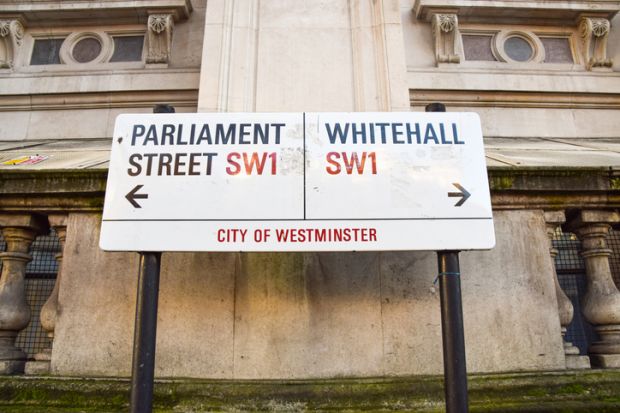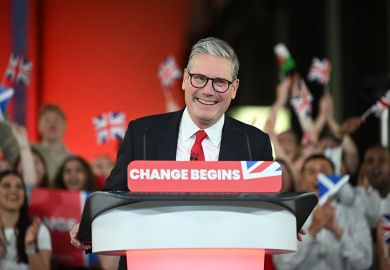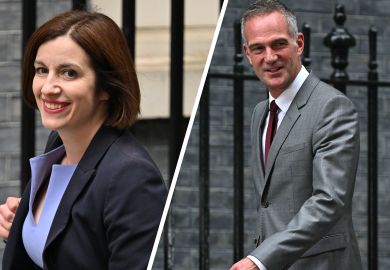Hopes have been raised that the new Labour government can make “rapid progress” on the issues facing UK universities after the appointment of a new ministerial team that includes several unexpected faces.
While new education secretary Bridget Phillipson and new science secretary Peter Kyle were widely anticipated to be given their ministerial roles, Jacqui Smith, who will take on the higher education brief, and Sir Patrick Vallance, who will become science minister, came as a surprise to the sector.
Ms Smith, a former home secretary under Gordon Brown and well-known media commentator, told her own podcast, For the Many, that she felt she had unfinished business in government, having been forced to quit the Cabinet in 2009 after becoming embroiled in the expenses scandal.
“I am at the end of my political life, not the beginning. I hope this will be a really good and effective and enjoyable period of time,” she told her co-host, broadcaster Iain Dale. “Doing the thing that didn’t end well for me and that I always wanted to have the opportunity to do again.”
Campus collection: Election special: how can higher education make its case amid political change?
While Ms Smith has little relevant higher education experience, her background as a senior minister has raised hopes that she could get up to speed quickly and start to make changes to counter the funding pressures faced by institutions.
Ms Smith’s appointment “gives a sense that this is an area that is being prioritised” by Labour’s leader, Sir Keir Starmer, and was a “signal of intent”, according to Catherine Haddon, a senior fellow at the Institute for Government.
“Universities are struggling at the moment, and the future funding of them is a complex environment. Some of these decisions will end up being made by the Treasury, but having an experienced hand in that brief means she will be used to talking to and engaging with the Treasury, so can help bring a good relationship there,” she added.
Graham Galbraith, vice-chancellor of the University of Portsmouth, said he was confident that the new minister “will bring her wealth of government experience to bear in tackling the numerous pressing issues afflicting the sector” and her “time spent shepherding important legislation through parliament will be essential” to help meet the party’s commitment to secure the future of the sector.
He said combining higher and further education along with skills in Ms Smith’s brief would promote the “necessary collaboration required” to ensure that the post-16 sector can “tackle the myriad issues facing the UK”.
Sir Patrick brings scientific heft and expertise to his role, having served as the UK’s chief scientific adviser in the last administration, but his appointment has raised questions about where the line between scientists and politicians sits and how the science policies of the new government will break from those of its predecessor.
A biomedical scientist who was a professor in UCL’s medical school before going to work in the pharmaceutical industry, Sir Patrick is expected to take on much of the brief that concerns universities, such as research funding and strategy, with Mr Kyle more focused on digital technologies and artificial intelligence.
Sir Patrick will also have to get to grips with the mechanisms of the House of Lords, where he, like Ms Smith, will be responsible for representing the government and guiding relevant legislation through the upper chamber.
On the flip side, Sir Patrick will be familiar with the biggest science policy issues of the moment, said Martin Smith, the head of the Policy Lab at Wellcome, including “the need for ambitious long-term funding and a financially sustainable university sector, to bring down the upfront cost of visas for researchers, and to invest in infrastructure to support science”, and he can make “rapid progress”.
His appointment “gives us hope the political significance of science will be maintained”, said Mr Smith, after a general election campaign that saw it gain little attention.
Neither figure was likely to see their new position as a stepping stone to higher office and, particularly Sir Patrick, could be in post for some time, according to Dr Haddon, bringing some continuity to the departments after several years of change.
Rama Thirunamachandran, vice-chancellor of Canterbury Christ Church University, said he had seen 11 different secretaries of state for education in his 11 years at the university.
He said he was confident that the new government would “take a much more positive and proactive approach to thinking about universities, and if nothing else, there will be a more positive discourse about universities and their role in society”, which was “welcome at a time when staff and student morale across the sector has been low due to the constant negativity”.
Sir Steve West, vice-chancellor of the University of the West of England, said what was needed was ministers who were passionate about their brief.
“Frankly, I don’t care which minister is in play as long as they are absolutely clear that universities and colleges working together are a driver for economic growth and for prosperity. I will work with anyone that is engaging and wants to be working with us to create solutions.”
Register to continue
Why register?
- Registration is free and only takes a moment
- Once registered, you can read 3 articles a month
- Sign up for our newsletter
Subscribe
Or subscribe for unlimited access to:
- Unlimited access to news, views, insights & reviews
- Digital editions
- Digital access to THE’s university and college rankings analysis
Already registered or a current subscriber?








